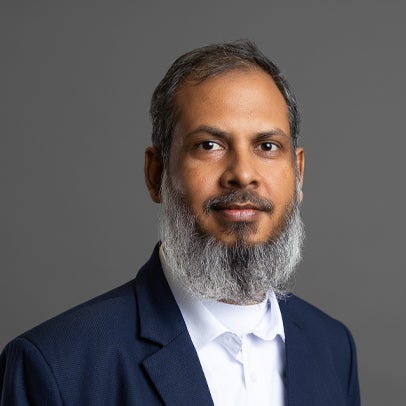
Dr. Kabir Hassan Biswas
Associate Professor
Dr. Kabir Hassan Biswas
Associate Professor
Educational Qualifications
PhD in Biological Sciences
MS in Biological Sciences
Entity
College of Health and Life Sciences
Division
Biological and Biomedical Sciences
Biography
Dr. Kabir Hassan Biswas joined the College of Health and Life Sciences at Hamad Bin Khalifa University as an Assistant Professor in 2019 and was promoted to Associate Professor in 2025. He earned his Master's and PhD through the prestigious Integrated PhD program at the Indian Institute of Science in 2007 and 2011, respectively. He then conducted postdoctoral research at the National University of Singapore and Nanyang Technological University between 2011 and 2019.
Dr. Biswas’s laboratory takes an interdisciplinary approach, integrating computational methods such as AI/deep learning-based protein design, protein structure-function analysis and drug discovery and experimental techniques such as bioluminescence-based biosensors and biointerfaces with the aim to advance fundamental understanding and developing potential treatment for cancer metastasis, cardiovascular diseases, and infectious diseases. His group is also developing point-of-care tests for health and disease monitoring.
Dr. Biswas has received several competitive research grants, including Academic Research Grant, HBKU Thematic Research Grant, and Industrial Innovation Fund, and has published in high-impact journals such as Science, PNAS, The New England Journal of Medicine, and Nature Communications. He has delivered invited talks at major international conferences and received multiple awards, including the Yamaguchi Medal and the Mrs. C. V. Hanumantha Rao Medal.
PhD in Biological Sciences
Indian Institute of Science, India
2011
MS in Biological Sciences
Indian Institute of Science, India
2007
BSc in Biochemistry
Aligarh Muslim University, India
2004
- Therapeutic protein design and drug discovery using AI/deep learning-based and other computational methods
- Expanding capabilities of the BRET technology to engineer biosensors for biomolecule and protease activity detection
- Computational and experimental approaches for protein structure-function analysis including the effect of disease-causing mutations
- Supported lipid bilayer-based interface for reconstituting juxtacrine receptor-ligand signaling
Associate Professor
College of Health & Life Sciences, Hamad Bin Khalifa University
2025 - Present
Assistant Professor
College of Health and Life Sciences, Hamad Bin Khalifa University
2019 - 2025
Senior Research Fellow
NTU Institute of Health Technologies (HealthTech), Nanyang Technological University, Singapore
2018 - 2019
Senior Research Fellow
School of Materials Science and Engineering, Nanyang Technological University, Singapore
2017 – 2018
Senior Research Fellow
Mechanobiology Institute, National University of Singapore, Singapore
2016 – 2017
Research Fellow
Mechanobiology Institute, National University of Singapore, Singapore
2011 – 2016
Complete Publication Listing(s): Google Scholar
- Stanford/Elsevier's Top 2% Scientist Rankings (2025)
- Outstanding Faculty in Biosensors, Venus International Foundation, Chennai, India (2024)
- Yamaguchi Medal, Asian-Pacific Association for Biomechanics, Nagoya University, Japan (2017)
- Mrs. C V Hanumantha Rao Medal, Indian Institute of Science, Bangalore, India (2012)
- Senior Research Fellowship, Council of Scientific and Industrial Research (CSIR), Government of India (GoI) (2009)

